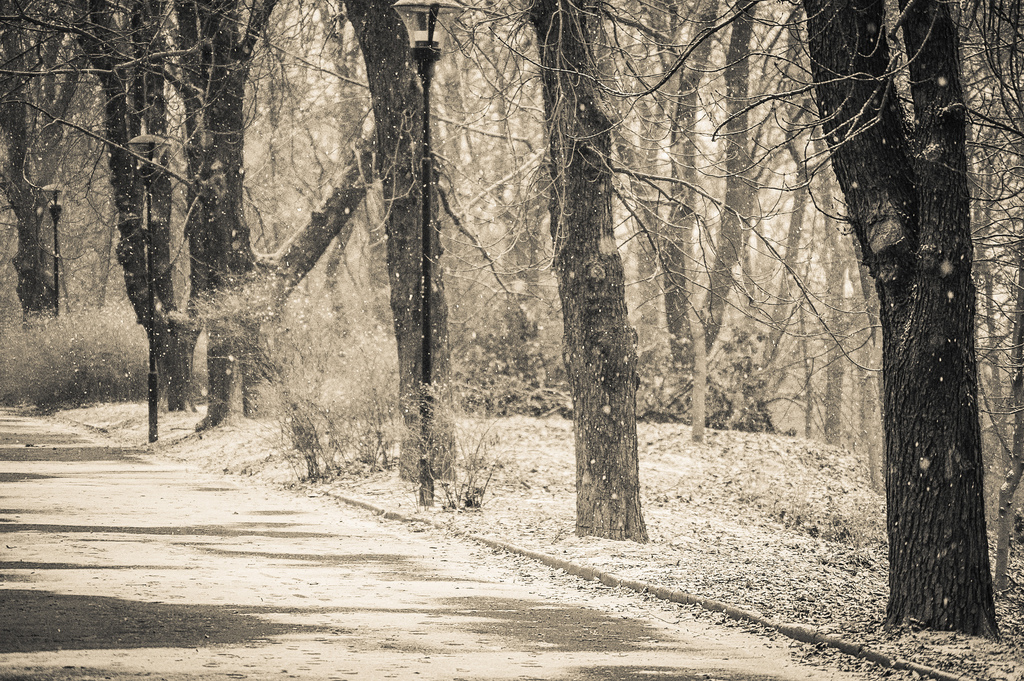By Aisha Shahnaz
Robert Frost’s “Stopping by the Woods on a Snowy Evening” is an all too familiar poem, inscribed in many literature collections and often required reading in certain English classes. In sixteen lines of poetry, Frost portrays a contemplative narrator traveling through a quiet winter landscape who stops briefly to watch the woods fill up with snow. The last four lines of the poem, though simple and unassuming, can speak in a sense about our journey through this ephemeral dunya (world) towards the Hereafter. Frost writes, “The woods are lovely, dark and deep. But I have promises to keep, And miles to go before I sleep, And miles to go before I sleep.” ((Frost, Robert. New Hampshire. New York: Henry Holt and Company, 1923. Print.))
The image of the traveler is deeply embedded in teachings in Islam. Narrated Mujahid, ‘Abdullah bin ‘Umar said, “Allah’s Apostle took hold of my shoulder and said, ‘Be in this world as if you were a stranger or a traveler,” (Sahih Bukhari). On another occasion, ‘Abdullah ibn Mas’ud said, “The Messenger of Allah ﷺ (may Allah bless him and grant him peace) slept on a straw mat and when he got up he had a mark on his side. We said, ‘Messenger of Allah, we could make a covering for you?’ He replied, ‘What have I to do with this world? I am only in this world like a rider who seeks shade under a tree and then goes on,'” (Tirmidhi). From these ahadith (sayings of the Prophet ﷺ) we can acquire so much: that as travelers we must always keep in mind where we are headed, that we needn’t be burdened by excess luggage, that because our stay is temporary we need to live a sincere life and leave a virtuous legacy.
In Robert Frost’s poem, we can sense that the traveler is drawn by the apparent serenity of the snow and the woods, but this serenity is illusory. It isn’t permanent or everlasting. He considers laying aside his prior engagements to stay here where “the woods are lovely, dark and deep,” yet an ardent calling urges him forward towards his ultimate journey’s end. It is important for us to remember that this dunya can be beguiling, that at times the thought of stopping to repose can be alluring, but that we have an important journey to complete and higher purpose to answer for. We have “promises to keep,” namely to worship Allah subhanahu wa ta`ala (glorified is He), to try to fulfill all our obligations of faith with sincerity and humility, treat those around us with compassion, and strive for a peaceful akhirah (Hereafter).
We have “miles to go” before we “sleep”. We must use the time we are given to grow—to learn how to be kinder, more sincere, more forgiving, and more understanding. On our journey as travelers, we may hold a variety of roles: as students, teachers, workers, leaders, followers, activists, or volunteers. We are each, though traveling at our own pace, torchbearers of an important message, blessed with the ability to truly make a difference whilst on our voyage if we try. I attended a lecture by a prominent speaker a few years ago who asked us to imagine what would happen if the lights suddenly went out in the lecture hall. He went on to say that eventually the attendees could utilize their available resources (lights from their cell phones, keychain flashlights, lighters etc.) to work together to reach the exit and a find a way to turn on the light to end the darkness. He reminded us that in this life we have to learn how to use the resources we have, the light we each have been blessed with, to make it through the darkness and reach everlasting light.
Ultimately, what I’ve taken from the last few lines of “Stopping By the Woods on a Snowy Evening,” and more importantly, from the wisdom of the Prophet ﷺ in recommending living as a traveler, is that it may be snowing in the woods now and you may consider settling down out in the cold, but iridescent and beckoning ahead, a destination of true warmth and comfort lies awaiting, an everlasting refuge in the company of the righteous and nearness to the Creator. And that’s something worth striving for.


Masha Allaah. Such a beautiful narrative. Everything on Earth is ephemeral and like the snow, it will all melt away. The Aakhirah is truly a worthy destination.
I LOVE THIS! This has always been one of my favorite poems for many reasons…and you’ve added so much more. Barak Allahu feeekkkii!
Assalamualaikum Dear Sister,
Jazakallah Khair for this very thought provoking article. I specially loved the example of the lights in the lecture hall – truly, Alhamdullilah, we as muslims have truly been blessed with a special flashlight called ‘Iman’in our heart & it is upto us to dig it out from the darkness we have surrounded it with while we live this busy dunya life.
May Allah reward you for your reminders.
A sister in faith
Awesome piece mashAllah. Jazak Allahu Khair for sharing!
[…] Robert Frost’s “Stopping by the Woods on a Snowy Evening” is an all too familiar poem, inscribed in many literature collections and often required reading in certain English classes. In sixteen lines of poetry, Frost portrays a contemplative narrator traveling through a quiet winter landscape who stops briefly to watch the woods fill up with snow. The last four lines of the poem, though simple and unassuming, can speak in a sense about our journey through this ephemeral dunya (world) towards the Hereafter. Frost writes, “The woods are lovely, dark and deep. But I have promises to keep, And miles to go before I sleep, And miles to go before I sleep.”1 […]
JAK for this thought-provoking article! I shared this with a youth halaqa recently and they loved it.